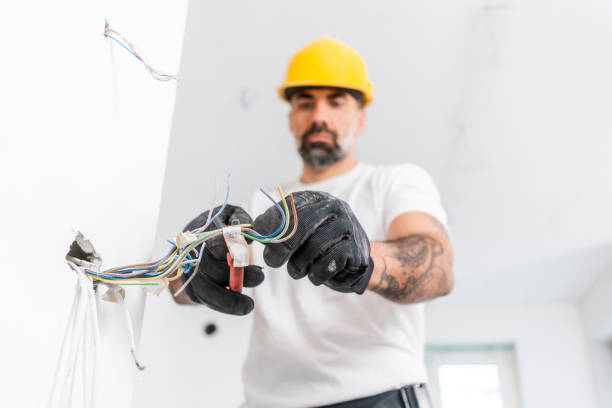Have you ever had your lights flicker when the washing machine kicks in? Or that one socket in the hallway that “sometimes” works and sometimes… doesn’t? Most of us shrug it off. Big mistake. Those tiny annoyances are often warning signs of something much worse hiding in the background.
That’s where an electrician in Dagenham earns their keep. They’re not just fixing obvious problems—they’re trained to find the stuff you can’t see. The loose connection is buried in the wall. The wire is slowly overheating. The breaker that’s just one surge away from failing. Basically, they’re detectives for your home’s electrics.
So, how do they pull it off?
The Obvious (But Easy to Miss)
First, electricians pay attention to the stuff we tend to ignore. A socket that feels warm when you unplug something. A breaker that trips once a week (you reset it and forget about it). That faint buzzing near a switch.
To you, it’s probably nothing. To them, it’s a clue. Like a mechanic hearing a noise in your car that you can barely notice. They know from experience that little issues rarely stay little.
Tools That Feel Like Superpowers
This is where things get clever. Electricians don’t just rely on eyesight. They’ve got gear that makes them look almost psychic.
- Thermal cameras – pick up heat patterns in wires. Hot spot in the wrong place = danger brewing.
- Multimeters – check voltage, current, and resistance. Bread and butter stuff, but it tells them what’s really going on.
- Circuit tracers – follow wires behind walls. Handy when you’ve got no idea what’s connected where.
- Insulation testers – spot weak or failing insulation, which is often the start of hidden fires.
With these, they don’t just find problems. They can often say, “This will fail in six months if we don’t sort it.” That’s the difference between a quick fix and a nightmare bill.
Why Hidden Faults Are So Nasty
Here’s the thing: most electrical fires don’t start with sparks flying. They start quietly. A wire gets loose, overheats a little, and keeps doing that over time. Or insulation cracks and slowly deteriorates. Nobody notices until the day it tips over the edge.
The dangers are real:
- Fires. Easily the biggest risk.
- Electric shocks. One second of contact can change your life.
- Dead appliances. Surges can kill TVs, fridges, computers—without warning.
And honestly, the worst part is that you often get no real warning.
Why Checks Save Money (and Stress)
Most people call an electrician when something breaks. But that’s like waiting for a toothache before visiting the dentist. By then, it’s painful, messy, and expensive.
That’s why regular inspections matter. This is where good electrical contractors in London stand out. London’s full of quirky properties—Victorian houses with ancient wiring, new builds crammed with appliances. Each one has different risks. Contractors who know the local building styles can spot issues faster.
A proper check-up usually means:
- Testing outlets and switches.
- Checking consumer units/fuse boxes.
- Looking for overloaded circuits.
- Making sure everything’s up to modern safety standards.
It’s not glamorous work, but it prevents so much hassle.
Instinct You Can’t Buy
Of course, no tool in the world replaces gut feeling. Experienced electricians often “just know” when something isn’t right. Maybe it’s a faint smell, maybe the way a breaker feels when they reset it. Years of doing the job sharpen instincts in a way you can’t teach from a manual.
I once heard an old-school spark say, “If I can hear a hum, I know where to look before I even open the panel.” That kind of know-how is priceless.
Things You Might Notice Yourself
You don’t need to be an electrician to pick up warning signs. Keep an eye (and ear) out for:
- Lights that dim randomly.
- Breakers tripping again and again.
- Sockets that feel hot.
- Strange burning smells (even faint).
- Crackling or buzzing near switches.
If you see any of these, don’t ignore them. Call someone in. Trust me, it doesn’t get better on its own.
Why Local Is Best
Here’s a practical point: a local electrician is often the better bet. Someone who works nearby—like an electrician in Dagenham—knows the local houses, estates, and the kind of wiring quirks they tend to have. They’ve seen the common problems already, which means they’re quicker at finding the source.
And if something goes really wrong, you’ll be glad they’re not driving across half of London to get to you.
Wrapping Up
Electrical faults are sneaky. They hide, they wait, and they often give tiny hints before turning into disasters. Electricians catch those hints, with sharp eyes, clever tools, and a dose of instinct that comes from years on the job.
So if your lights are flickering or your sockets feel warmer than they should, don’t shrug it off. Call someone in. Because when it comes to electricity, prevention isn’t just “better than cure”—it can literally save your home.
And if you’re local? Well, finding a trusted electrician in Dagenham is one of the smartest moves you’ll ever make.
 WhatsApp Us Now
WhatsApp Us Now









